Bruxism (commonly referred to as teeth grinding) is a condition you could be suffering from without even knowing.
It is characterised by involuntary clenching, grinding, grating and gnashing of the teeth, and symptoms are not always displayed in ways that are immediately noticeable.
Bruxism is a parafunctional habit, which is the habitual exercise of a body part in a way that is different to the most common use of that body part.
Teeth grinding is a surprisingly common condition that generally occurs during the night, however it can also occur during the daytime, or both. Night Bruxism is usually associated with grinding and may generate a loud grating sound. Bruxism during the day is more commonly associated with clenching of the teeth and jaws, rather than grinding, and is usually silent. It can be exhibited subconsciously while concentrating or during heavy exercising.
Most people are not aware that they are grinding their teeth until their partner tells them about it (if their partner hears it at night), or until they start experiencing more advanced symptoms such as tooth aches, jaw pain, headaches, and worn down/sensitive teeth. You may also experience general tiredness if night grinding disturbs your sleep.
Causes of teeth grinding
The cause of teeth grinding is not always straightforward. It may be either physical or psychological, or a mixture of both.
Physical causes
Physical causes are likely related to malocclusion. Malocclusion is a misaligned bite and can be caused by factors including crooked teeth, missing teeth, or jaw misalignment for example an under-bite. In a misaligned bite, the upper and lower jaws come together but the teeth don’t seem to fit together comfortably, so you overcompensate and try to force them into a perfect bite. Teeth grinding has also been associated with some forms of sleep apnoea.
Other factors
Other factors that might contribute to night grinding specifically, include your caffeine intake, your alcohol consumption, and your daytime chewing or grinding habits (voluntarily or subconsciously).
Psychological causes
Psychological causes include emotions (such as anxiety, stress, anger, frustration or tension), illness, poor nutrition and long-term pain. It may also be a coping strategy or habit during deep concentration. In some cases, the grinding may initially be caused by a psychological reason, but then a regular habit may form over time.
Symptoms of teeth grinding
Teeth grinding places a great deal of pressure on your teeth and can cause various forms of damage. Symptoms include:
- Worn down enamel (the outer layer of your teeth).
- Fractured, chipped, or loose teeth.
- A dull headache, sore jaws and/or ear pain.
- Aching teeth, and stiffness in the face and temples (particularly when you have just woken up).
- Sore jaws while you’re chewing, biting or yawning (particularly at breakfast time for night bruxism, or late in the afternoon for daytime bruxism).
- Sensitivity to hot and cold food and drinks.
- If you notice you are intensely clenching your jaw.
It can sometimes be challenging to pinpoint the symptoms of grinding. If you grind your teeth at night, you might have some symptoms when you first wake up but they may quickly disappear. If you grind your teeth during the day, symptoms might not be noticeable until later on in the day.
Treatments for teeth grinding
The most appropriate treatment for teeth grinding will depend on the cause, which will be investigated at an evaluation consultation.
Mouthguards

If the grinding occurs unknowingly during sleep, the most common solution is a custom-fitted and durable hard plastic mouthguard. This is worn on your upper teeth (the same as a sports mouthguard) whilst you sleep. It will help reduce the pressure of tooth grinding, and will shield your teeth from further damage by preventing them from grinding against each other (on the chewing surfaces).
Orthodontic or restorative dentistry
If you are suffering from malocclusion, we are able to make adjustments to your teeth through either orthodontic (for example braces) or restorative (for example dental crowns) treatments. This will create a more balanced bite, and may reduce or rectify the subconscious effort you are making.
Muscle relaxant injections
Although muscle relaxant injections are not a cure for bruxism, they may effectively control the symptoms. By injecting small doses of the treatment directly into the masseter muscle (the large muscle that moves the jaw), the muscle is relaxed enough to stop the involuntary grinding of the teeth, and clenching of the jaw. Voluntary movements, such as chewing and facial expressions, will not be affected by the treatment.
Supplementary treatments
If psychological factors are likely contributing to your bruxism, it may be beneficial to involve your other health professionals (such as a GP and psychologist), as well as your dentist, to assist in the treatment of both the cause and the symptoms.


